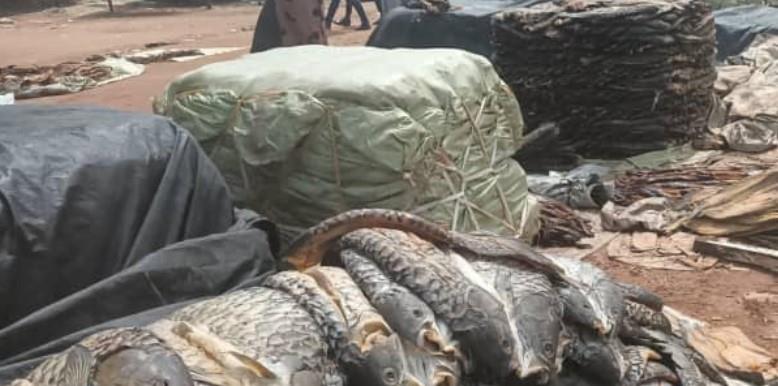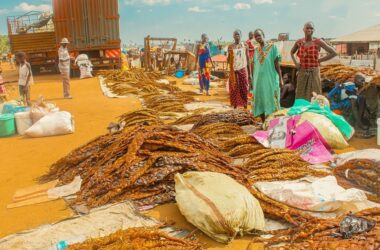By Charles K Mark
Fish traders operating in Jonglei State’s capital, Bor, have voiced their grievances about the high taxes imposed on them by the local government.
The taxes, according to the traders, are having a detrimental impact on their ability to grow their businesses and succeed as entrepreneurs.
The sellers said the rising floodwaters in some parts of the state have contributed to high fish production, hence boosting the fish business, but hefty taxes frustrate their gains.
One young business entrepreneur, Michael Kung Atem, feels good that, through selling fish, he can now afford to take care of his wife and three (3) children.
“I bring fish from the swamp area. It is good to do your own work instead of depending on other things,” Kulang said.
While praising the benefit of selling fish, Kulang couldn’t resist pointing out the burden they incur in running a fish business in Jonglei.
He said that besides lacking proper storage facilities for their fish stock, they (the sellers) are also burdened by the excessive taxes the state authorities impose on them.
“Last time that I came here, the government could take 50% of what I do. When the government is taking something from what I do, they need to provide some service for me so that it should protect my fish and where I stay,” he stressed.
Mr. Kulang urged the government to provide the local traders with conducive market platforms for them to connect with their buyers at better prices.
The fish trader discovered that when the market is good, at times he gets 4, 000 SSP from a bundle of fish called “leks” in Dinka and “Nok” in Arabic, which earns him up to over 40,000 SSP.
Despite the challenges, Kulang revealed that selling fish helps him to sustain his family by paying tuition fees for himself and the children and also medication for the family in times of sickness.
According to him, profits vary with the type and size of fish that customers want from the market.
“If it is the big one, it is 1,000 SSP. Another one is 500 SSP if it is tilapia. Tilapia is 1,500 SSP, where I come from. The salted one now is very expensive,” he explained.
“Now the salted is 10,000 South Sudanese pounds. Plus, the transport cost when you bring it here may reach SSP 15,000. It costs us a lot of money, and it causes us to make a loss in the business,” the young trader continued.
Another dealer from Juba, Martha Majok, who went for her second trip to Bor fisher market, said she finally found her best quality of fish in Bor.
“This is our second time to come over, and today I think we found the kind of fish that we want in good quality, and it is clean,” said Majok.
She said they buy a bundle (three pieces) at 5,500 SSP in Bor but sell a kilogram in Juba at 2,000 to 3,000 SSP.
The trader said she chose the fish business because it is in abundance and produced in South Sudan.
“We must do business with the things that God has blessed our land with. We can do a lot of things, but I think the fish business is good too,” Madam Majok narrated.
Challenges faced
Though the rains bring more water and produce more fish, Majok complained of the inaccessibility of roads that turn slippery.
She expressed the need for a spacious storage area for fish, citing the absence of suitable facilities and shelter.
She said that the fluctuation of the foreign currency (US dollars) is also something that is supposed to be discussed at the government level since it affects local trade.
Jacob Mabor, a seasoned wholesale buyer, continues to sell fish due to the lack of other income sources.
He cited that too many taxes and the high cost of transportation are affecting their business.
“If the price of fuel is very high, everything will go up. So if you buy the fish and sell it, the money that you earn will be at a loss,” Mabior disclosed.
The fish trader said one can only see profits by increasing the fish price in case the fuel price goes up.
“The benefit of this one is not really a benefit because of taxation and transport,” Mr. Mabor insisted.
“If the place is very near, one pays SSP 150,000. And if it is very far, like Juba, the tax charges are 300,000 SSP,” he added.
The fishing trader’s union hails business.
Marko Majur, Jankush’s acting chairperson of the Jonglei Fishing Trader’s Union, said the country is currently exporting fish to Uganda, Congo, and Rwanda.
He said the venture offers employment opportunities to over 10,000 youths in Jonglei and beyond, something that enables the youth to engage in development activities.
“Youth who engage in fishing business earn income, and the government is also benefiting from this fishing business through taxes,” the union chair said.
He disclosed that in a good week, they can load over two to three trucks carrying an estimated 150 bundles of fish per truck, for which the government charges SSP 1,000 per bundle.
He complained that too many checkpoints with people in uniforms collecting unreceipted money is a major challenge facing truck drivers exporting fish.
“We are being overtaxed within the country, and yet I know exports are not supposed to be taxed within the country but in the importing country, so now that is affecting us,” she continued. “What we export is being leveled by what we import”.
In the heart of Jonglei State capital Bor, the completion of the new asphalt Juba-Bor Highway became a symbol of hope for jobless youth.
The highway has started paying off as it expedited and eased transportation and ushered in new opportunities, particularly in the form of the now flourishing fish business.
Jonglei partly lies in the Sudd, one of the largest swamps in the world, with a diverse freshwater ecosystem that extends from Mangalla in Central Equatoria State to the Sobat River in Upper Nile State.
A home to a large and various fish species, fishing in the Sudd is practiced heavily by the inhabitants of the area, mainly for food and income generation, but lately, they are beginning to venture into commercial fishing.



